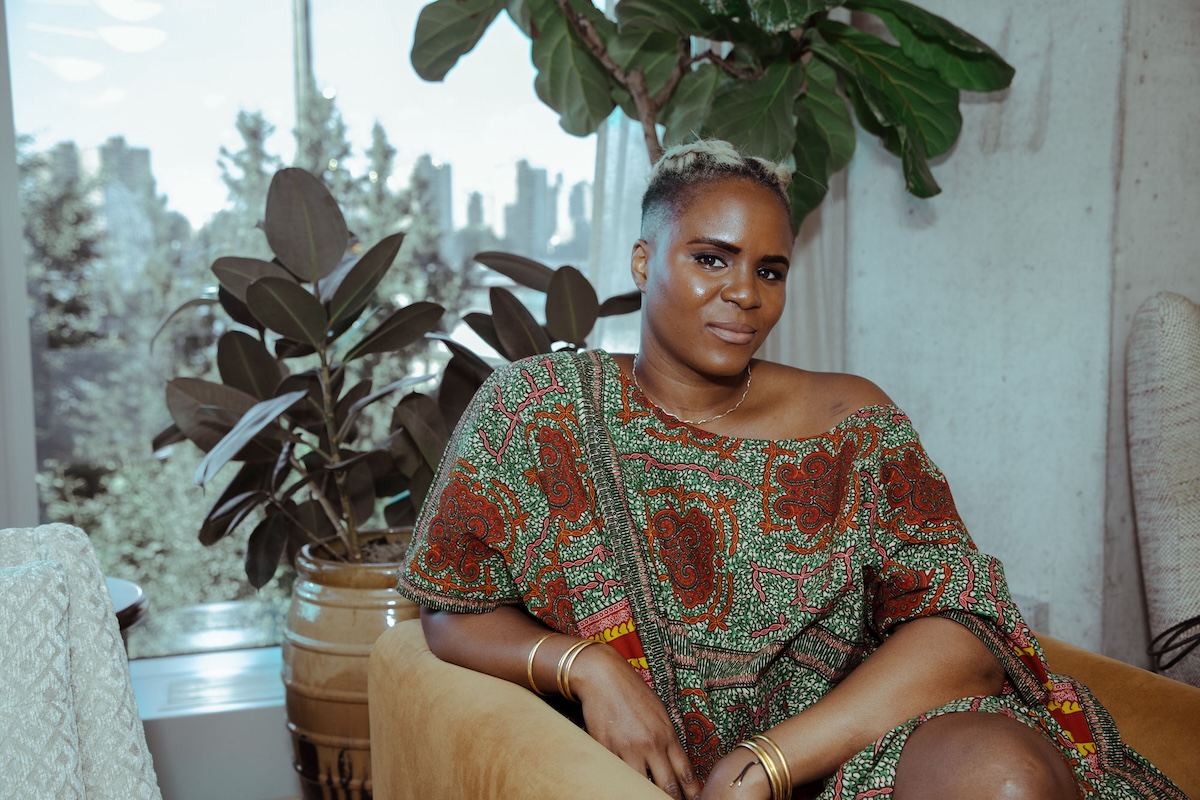
How The Black Beauty Club’s Salon-Style Conversations Show Beauty Is More Than Skin Deep
January 13, 2025
Rana Good is the founder of Naïra NYC. A writer for publications such as Forbes, Travel + Leisure, Coveteur, Mens Journal and others, she created her own platform celebrating women of color.
In an era dominated by online interactions, The Black Beauty Club showcases the passion that only in-person discussions can ignite, particularly when exploring Black beauty and culture. Using beauty as a lens, the events dive into broader topics like entrepreneurship, politics, and identity through engaging panels and discussions. With events drawing audiences of around 100 people in cities like New York, Los Angeles, and London, the rooms are packed with enthusiastic participants. The community’s passion is so palpable that the conversations often feel as though they could continue hours beyond their scheduled time.
Tomi Talabi is the mastermind behind The Black Beauty Club which initially started as online discussions on Clubhouse in 2020, and later segwayed into the highly popular events they are today. We spoke to Talabi about building The Black Beauty Club community, how she juggles it with her career in tech and motherhood, and why 2025 will be the community’s biggest year yet.
How did Black Beauty Club start?
Tomi Talabi: I was building a concept on the Black beauty market as a marketplace to bring Black-owned brands into one space. The idea was to simplify things for consumers by reducing shipping fees and helping businesses reach a wider audience.
The journey evolved when I joined Clubhouse. I noticed there weren’t many conversations about beauty, which was my background — I’ve worked in the industry for years. My first talk came from a conversation with my friend Lauren Napier, who was already making waves as a beauty founder. Together, we explored the state of the investment industry in 2020, asking if Black founders were truly getting funding or just being strung along with endless calls.
That conversation was electric. Everyone in the beauty space joined, and it sparked something powerful. I started hosting more talks, bringing in collaborators like Ezinne Price, the founder of SKN Muse, who organized grant sessions to help entrepreneurs access funding. It became clear people needed these resources.
What surprised me was how these conversations grew beyond business into culture. People were passionate about topics like global beauty standards and rituals. It was eye-opening to hear someone with an Irish or French accent share the same struggles with beauty norms as someone in Nigeria or the U.S.
For example, my friend Jihan, an editor, shared a story about visiting Ghana in the early 2010s, expecting a haven for natural hair care. Instead, she spent two weeks struggling to find a salon that catered to natural hair.
As Clubhouse started to decline, I realized I didn’t want the community we’d built to fade away. So, I pivoted to live events, partnering with members’ clubs to bring these conversations into physical spaces.
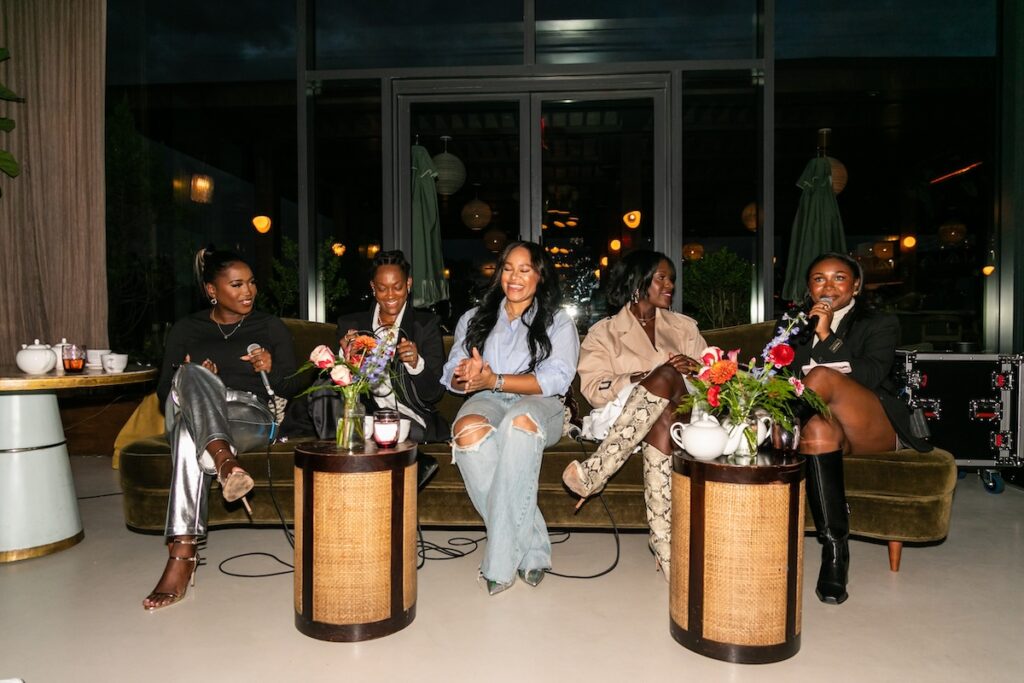
Who is the Black Beauty Club audience?
Our audience is more than beauty lovers — they’re cultural influencers. They care about products, ingredients, and founders, but also the deeper cultural significance of beauty. For them, beauty is about self-expression, identity, and sometimes even making a political statement. It’s about finding brands that align with who they are and what they stand for — a full lifestyle, not just a product.
What are the conversations at Black Beauty Club that aren’t had elsewhere?
One of my favorite conversations this year was on desirability politics and desirability. It was so engaging that I felt like I was leaving a movie halfway through — everyone was so passionate, and the energy was electric.
It’s a tough topic to tackle because desirability politics touches deeply personal insecurities. For many, it reflects where they see themselves on the spectrum of beauty, and no one likes to feel their attractiveness is being questioned.
The key is to approach it carefully — not focusing on traits like loosely curled hair or lighter skin, but instead addressing the root causes. It’s about creating a safe space to explore solutions so everyone feels valued and included in the conversation.
What have been some of your most memorable moments?
Another great discussion we had was about Black men in beauty, specifically male Black beauty influencers. It was incredibly eye-opening. People often assume queer Black men in beauty are thriving, but many feel like they’re treated as accessories to whiteness, like they’re playing a role rather than being valued for their expertise.
These men are expected to look great and fit the aesthetic, but when they voice real opinions — like critiquing a product or marketing strategy — they’re dismissed. They hear things like, “You’re a man; what would you know about women’s beauty?”
It’s especially striking when you think about how queer Black men are often celebrated as style icons but still treated as accessories rather than respected professionals. The irony is that the beauty industry, despite its focus on women, is largely run by men.
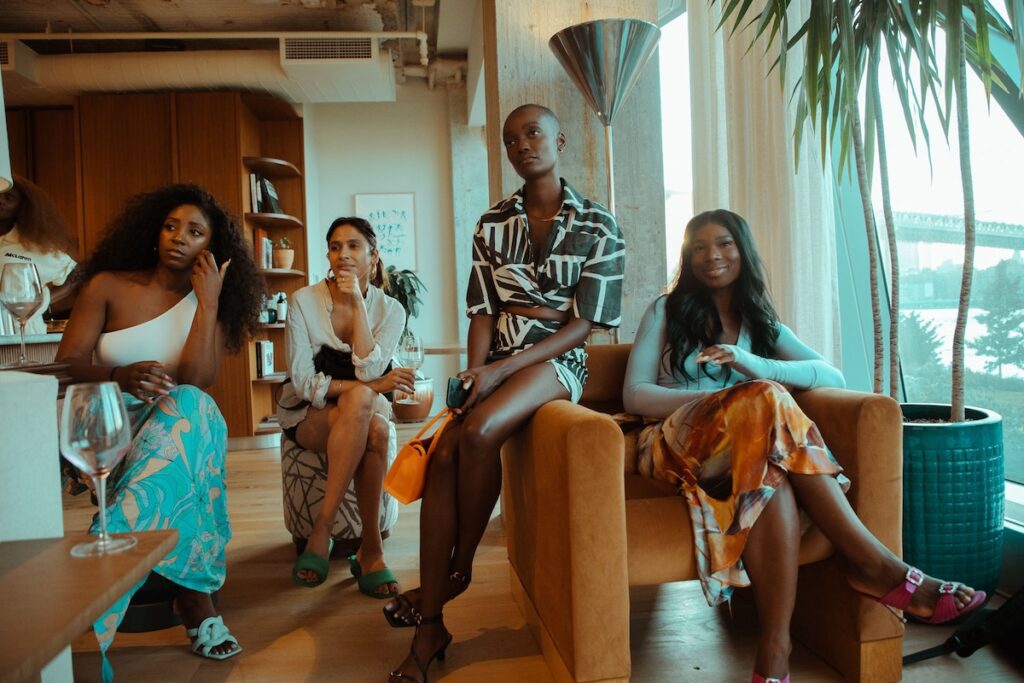
As a true beauty connoisseur, what are some of your favorite products?
It’s funny, my skincare routine is pretty simple, but I’m really particular about what I use. I love Epi.Logic’s Master Plan and, as a self-proclaimed sunscreen junkie, I’m obsessed with the new Hyper Skin sunscreen. It’s amazing! The texture is smooth, it gives a gorgeous glow, and it’s so lightweight. Since I don’t wear makeup, I need products that keep my skin looking fresh without layering too much.
I’m also a huge fan of KOBA Skincare. Their products are incredible, especially the bar soap, which I’m completely obsessed with. The brand sources ingredients like the safou plantfrom a farm in East Africa, and the quality is just unmatched. Surprisingly, the soap isn’t even one of their bestsellers, but I don’t get it, it’s so good that I’ve even converted my cousin into a fan. She’s now stocking up on KOBA like it’s going out of style, asking me to let her know the moment there’s a sale!
What opportunities has Black Beauty Club opened for you?
For me, the community has been an incredible gift. I’ve met some of the smartest and kindest people and watched them form meaningful connections. That’s what I truly love, seeing people come together in ways that matter.
The biggest opportunity it’s given me is the chance to do something beautiful in this world. I’m deeply passionate about justice, fairness, and finding purpose. I often ask myself, “What am I doing here?” It’s a question I pose to my son, my cousins, and my friends too.
I tell them, you don’t have to be famous or a historical figure like Malcolm X to make an impact. If you can change one person’s life in a way they’ll never forget, that’s remarkable. After you’re gone, if someone remembers that one good thing you did, it’s powerful.
As a Muslim, I also believe that when people think positively of you after you’ve passed, it increases your blessings. So, I try to focus on leaving more good behind than anything else.
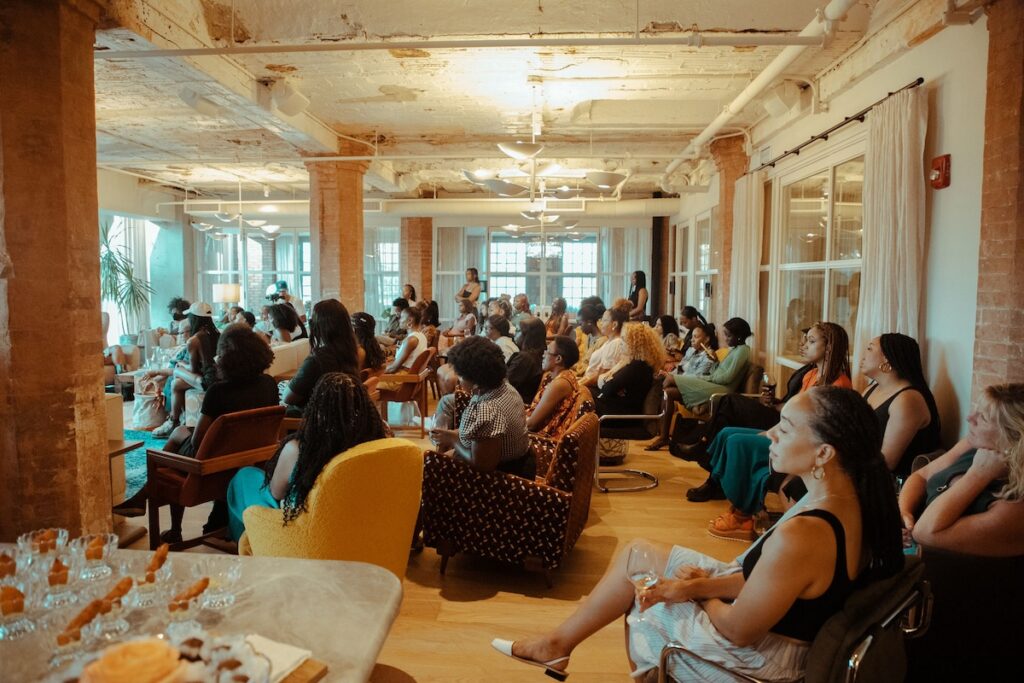
On top of Black Beauty Club, you work at Pinterest. How do you juggle both of your jobs?
Honestly, my biggest concern is balancing everything — being a mother, pursuing my passions, and managing work. I believe everyone should have hobbies or projects that fulfill them. For me, the Black Beauty Club allows me to explore things I can’t always do in my day job. It connects deeply with who I am — someone who cares a lot (maybe too much) about fairness and justice.
Even at Pinterest, I’m passionate about inclusive technology and have led several initiatives in that space. But I’ve learned there has to be balance. We live in a society that overly values job titles, but I’m not my title or my company. I’m an individual contributing to something I hope will make the world better.
That said, work alone doesn’t fill your soul. You need something else, whether it’s traveling, passion projects, or other joys that make life meaningful. Unfortunately, in today’s world, especially in America, it feels like work dominates everything. We wake up thinking about it, go to sleep thinking about it, and leave little room for anything else. Finding balance is essential.
What are your tips for people who want to start a business with a friend or acquaintance?
I still work with a lot of friends, and I think strong relationships come down to being open, transparent, and clear about what everyone brings to the table. Accountability is key. As a leader, I’m always striving to improve by recognizing people’s strengths, knowing when to pivot, and, if necessary, ending things quickly when they’re not working.
People often talk about “fail fast” or “hire slow, fire fast,” and there’s truth in that. If working with a friend isn’t aligning, you have to address it and move on. I’ve had collaborators feel overwhelmed because I work at a fast pace, and I’m running the show. For me, there’s no such thing as “this can’t happen.” If we set a date, it’s happening, period.
But I also recognize that my vision and mission are deeply personal to me. Not everyone shares the same level of passion because, for them, it might just be a job. For me, it’s about making my dreams a reality.
It’s about getting everyone on board with the vision while respecting their time and contributions. Most of us are doing this for free because we want to connect with our community and create something fulfilling outside of work. That means being mindful when team members need to step away and accepting help when it’s offered, even if onboarding someone new can feel daunting.
The Black Beauty Club is a unique, authentic space. It’s not about glitz and glam, though it can feel that way at times — it’s about how we feel and how we connect. Few spaces foster this kind of openness. Utibe Mbagwu and Mimi Sillah are the only other moderators because they understand the club’s purpose: critiquing the beauty industry intelligently and collaboratively, and exploring solutions.
Beauty is a deeply emotional topic. Conversations often uncover personal struggles — whether it’s frustration with hair, societal pressures, or memories of harsh criticisms from loved ones. It’s not just about the surface; the root issues often lie within the industry and its standards. You need a team that can handle these moments with care and guide the discussions thoughtfully.
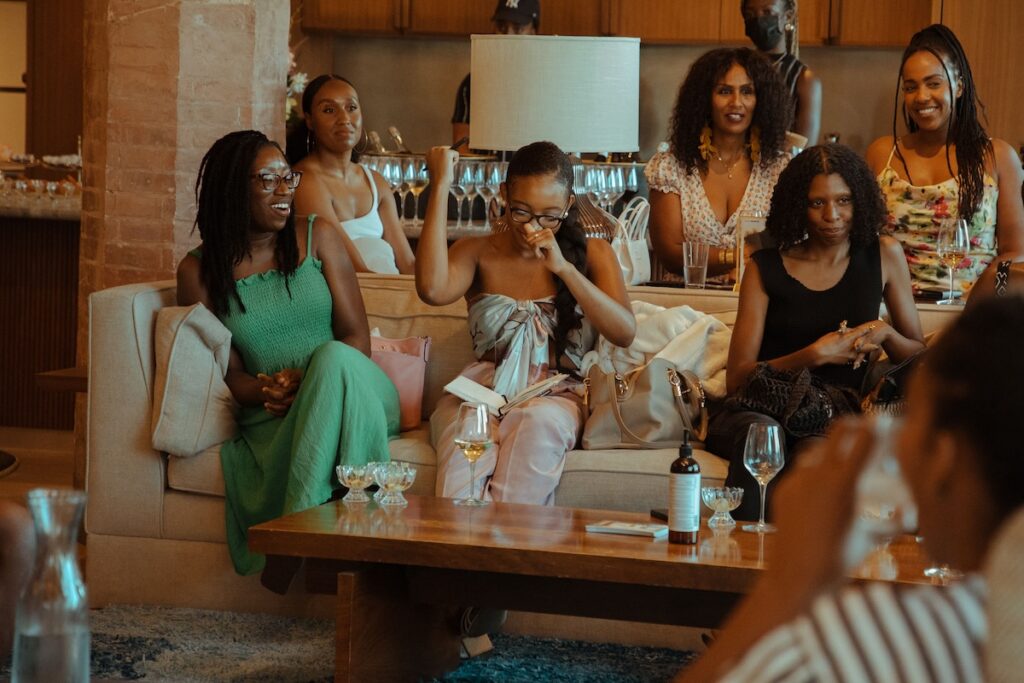
Where do you want to see Black Beauty Club grow?
There’s so much growth happening right now, and I’m beyond excited. We have a major marquee event coming up at the Time Center — though the details are still being hammered now. It’s going to be incredible.
And shortly after that, we’re hosting an intimate women’s event, also under wraps. This one is really special — just 50 attendees, including 10 to 15 powerhouse women from various industries: actresses, directors, politicians. The goal is to create a community code of behavior for Black women, something I think is so needed today.
Men often have an unspoken code of conduct, but I feel like Black women don’t have that shared framework, especially after the way we rallied to support Kamala Harris in the election and didn’t see the results we’d hoped for. It’s a reminder that we need to show up for one another consistently—not just when someone’s on the rise, but in every phase of their journey.
Post-election it feels like a lot of progress could be undone, what advice do you have for people who are feeling discouraged?
I know it’s been said in different ways, but I’ll say it again: you need to get involved in your community. The most meaningful changes — the ones that directly impact your life — happen at the local level. It’s your congressperson, alderman, school board, or neighborhood leaders who shape the things around you.
We tend to focus on the top-level officials, but real power starts small. For instance, criminal cases often get sent back to lower courts — are you voting for those judges? Are you engaged with the decisions affecting your community schools, even if you don’t have kids? A strong school benefits everyone by raising the value of the entire neighborhood.
My advice? Pick one thing you care about and dive in. Whether it’s the school board, a neighborhood cleanup, or tackling homelessness, there’s always something impactful you can do.
That’s how we build a brighter future—by starting small and staying involved.